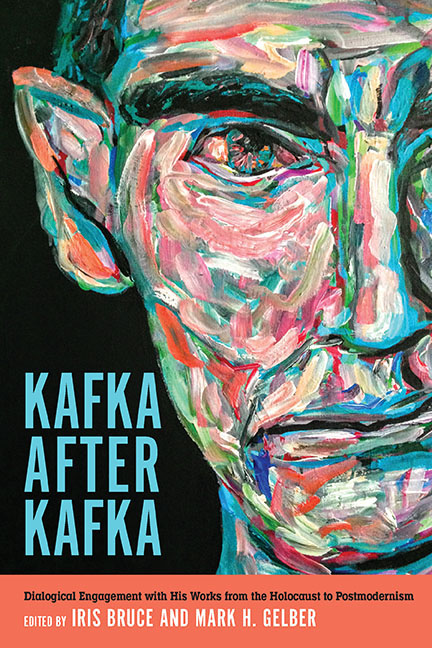Book contents
- Frontmatter
- Contents
- Acknowledgments
- Introduction
- Part I Philosophical and Literary Hermeneutics after the Holocaust
- Part II Kafka in Israeli Cultural Space
- 5 Kafka and Brod after the Trial and Judgments in Israel
- 6 “A Nightingale Whose Tongue Was Chopped Off”: The Melancholic Writing Machine in Ya'acov Shṭeinberg's and Ḥezi Leskly's Poetry, after Kafka
- 7 Exiles in Their Own Lands: Kafka and Sayed Kashua
- Part III Kafka from Modernism to Postmodernism
- Notes on the Contributors
- Index
5 - Kafka and Brod after the Trial and Judgments in Israel
from Part II - Kafka in Israeli Cultural Space
Published online by Cambridge University Press: 12 April 2019
- Frontmatter
- Contents
- Acknowledgments
- Introduction
- Part I Philosophical and Literary Hermeneutics after the Holocaust
- Part II Kafka in Israeli Cultural Space
- 5 Kafka and Brod after the Trial and Judgments in Israel
- 6 “A Nightingale Whose Tongue Was Chopped Off”: The Melancholic Writing Machine in Ya'acov Shṭeinberg's and Ḥezi Leskly's Poetry, after Kafka
- 7 Exiles in Their Own Lands: Kafka and Sayed Kashua
- Part III Kafka from Modernism to Postmodernism
- Notes on the Contributors
- Index
Summary
AT LONG LAST, in early August 2016 the Israeli Supreme Court rendered a final verdict in the protracted and acrimonious legal battle for the posthumous papers and private archive of Max Brod, which includes manuscripts, letters, and postcards written by Franz Kafka, in addition to important writings by Brod that are unknown to scholarship or to the public. The Supreme Court upheld the two previous juridical rulings concerning this case, which decided in favor of the National Library of Israel as the rightful repository for this material. The first ruling was made in October 2012 in the family court (inheritance law) of Tel Aviv—Ramat Gan after almost five years of litigation; the second ruling, affirming the first, was delivered in the district appeals court in June 2015. While the 2012 ruling was reached only after a long and complicated judicial process and agonizing scrutiny of the evidence and testimony, reflected in the almost sixty-page-long decision, the second and last verdicts appeared to be the result of much simpler procedures and reflections. Thus, a gradual simplification of the complexity of the case may be observed over almost a decade of legal skirmishes. Even though the legal dimension of this issue is now completed, the literary and cultural debates about it may continue for some time—at least until this profusion of archival material is made accessible to scholarship.
A few words concerning the background of the case are in order at the start. The National Library of Israel, located in Jerusalem, sued for ownership of the material following the death in 2007 of Max Brod's secretary, Ilse Esther Hoffe, who had taken legal possession of his literary estate when Brod died in Tel Aviv in 1968. On the other side of the case were Hoffe's daughters, one of whom died before the first verdict was rendered. Their case was based on the argument that as the legal heirs of their mother's possessions, this literary material belonged to them. Since the daughters had already made it known that they intended to sell the Kafka and Brod manuscripts to the Deutsches Literaturarchiv in Marbach, that German institution was also represented legally at the hearings as an interested party.
- Type
- Chapter
- Information
- Kafka after KafkaDialogic Engagement with his Works from the Holocaust to Postmodernism, pp. 79 - 97Publisher: Boydell & BrewerPrint publication year: 2019

